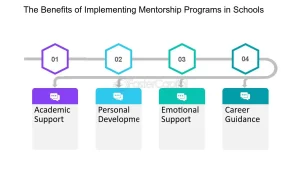Mentorship programs in education serve as a powerful tool for fostering personal and academic growth among students. These programs connect experienced individuals—mentors—with less experienced students (mentees) to provide guidance, support, and encouragement. The benefits of mentorship extend beyond individual development; they positively impact schools and communities as well. This article explores the various advantages of mentorship programs in educational settings.
 1. Enhanced Academic Performance
1. Enhanced Academic Performance
One of the most significant benefits of mentorship programs is their positive effect on academic achievement. Mentors offer personalized support and guidance, helping students navigate academic challenges. By setting goals, providing resources, and offering constructive feedback, mentors can boost students’ confidence and motivation. Research shows that students involved in mentorship programs often experience improved grades, higher test scores, and increased overall engagement in their studies.
2. Development of Critical Life Skills
Mentorship programs teach students essential life skills that are crucial for success both in and out of the classroom. Through their interactions with mentors, students learn effective communication, problem-solving, and decision-making skills. Mentors often model behaviors such as resilience, time management, and goal-setting, equipping mentees with tools to navigate future challenges. These skills are invaluable as students transition to higher education and the workforce.
3. Increased Social and Emotional Support
For many students, mentorship programs provide a vital source of social and emotional support. Mentors can help mentees develop a sense of belonging and community within the school environment. This connection is particularly important for students who may feel isolated or struggle with personal challenges. A supportive mentor can serve as a trusted adult, offering guidance and encouragement, which contributes to improved mental well-being.
4. Improved College and Career Readiness
Mentorship programs often focus on preparing students for life after graduation. Mentors can share their own experiences, provide insights into various career paths, and help students explore educational opportunities. This guidance is particularly beneficial for first-generation college students or those from underserved backgrounds, as mentors can demystify the college application process and offer practical advice on navigating higher education.
5. Strengthened Relationships and Community Engagement
Mentorship programs foster meaningful relationships not only between mentors and mentees but also among peers and the broader community. These programs encourage collaboration and networking, helping students build connections that can last a lifetime. Moreover, mentorship initiatives often involve community partners, which enhances community engagement and creates a network of support for students.
6. Professional Development for Educators
Mentorship is not just beneficial for students; it also provides valuable opportunities for professional development for educators. Teachers who serve as mentors gain insights into different teaching methods and student perspectives, enhancing their instructional practices. Additionally, mentoring relationships can foster a culture of collaboration among educators, leading to improved teaching environments and student outcomes.
7. Promotion of Diversity and Inclusion
Effective mentorship programs can promote diversity and inclusion within educational settings. By pairing mentors and mentees from different backgrounds, schools can encourage cross-cultural understanding and appreciation. This exposure helps students develop empathy and respect for diverse perspectives, preparing them for an increasingly globalized world.
 Conclusion
Conclusion
The benefits of mentorship programs in education are profound and far-reaching. By enhancing academic performance, developing critical life skills, providing emotional support, and preparing students for future challenges, mentorship initiatives play a vital role in shaping successful individuals. As schools and communities continue to recognize the value of mentorship, investing in these programs will be essential for fostering holistic development and creating a brighter future for all students. Embracing mentorship not only enriches individual lives but also strengthens the educational system as a whole, paving the way for a more supportive and empowered generation.


